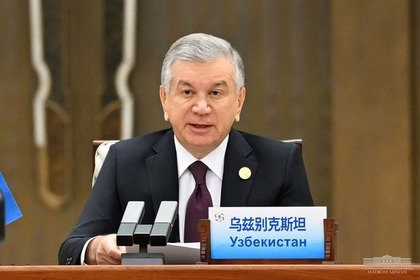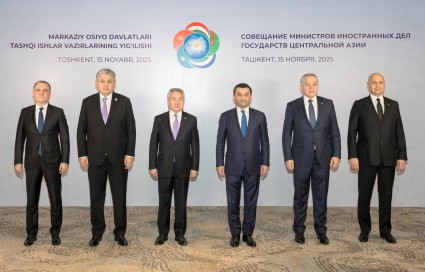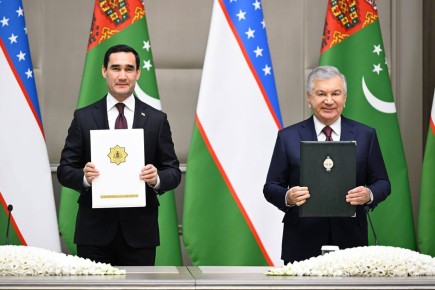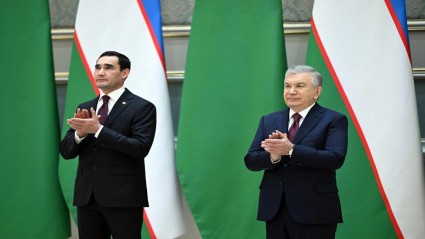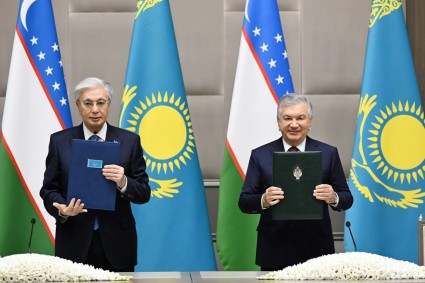The president Shavkat Mirziyoyev today attended the maiden Central Asia-China Summit in Chinese Xi'an, the presidential press service said today.
Presidents of Kazakhstan Kassym-Jomart Tokayev, Kyrgyzstan Sadyr Japarov, Tajikistan Emomali Rahmon and Turkmenistan Serdar Berdimuhamedov also attended the event, chaired by Chinese President Xi Jinping.
The parties reportedly discussed the ways to expand cooperation between the countries of Central Asia and China, topical international and regional issues.
Shavkat Mirziyoyev in his remarks stressed that amid global tensions, the current meeting was of particular importance.
Our countries, having overcome the ordeals of the pandemic, are faced with a global crisis of confidence. Serious gaps in sustainable transport and logistics chains, which are especially sensitive for Central Asia, the challenges of food and energy security, the risks of social tension against the backdrop of growing inflation imports and other problems require us to have closer coordination and practical interaction, he noted.
He said that today Central Asia was “a cohesive and strong region open to dialogue and full-scale partnership.”
Shavkat Mirziyoyev put forward a number of initiatives to develop regional cooperation based on a long-term agenda.
He noted the need to establish interaction between the leading "think tanks" of the six countries to develop strategic approaches, comprehensive recommendations and solutions, "breakthrough" projects of a regional and global scale. He proposed to hold the first International Expert Conference on conjugation of national development strategies in Samarkand next year.
The President dwelled on the conditions for sustainable development of the countries of the region, where the central place has been given to the effective fight against poverty.
“I am sure that the adoption and implementation of a joint program to improve living standards and develop territories, primarily rural areas, will be supported by our peoples and will become a common contribution to achieving the goals of the 2030 Agenda,” the Uzbek leader said.
He called for the formation of a “new economic dialogue” and strengthening interconnectedness, achieving a twofold increase in trade between the countries of the region and China by 2030 and proposed to ensure the implementation of this task through a balanced growth of mutual supplies of industrial goods and agricultural products, the creation of an efficient trade and logistics infrastructure and modern wholesale distribution networks, the introduction of green and express corridor systems, and common e-commerce platforms.
Shavkat Mirziyoyev proposed to consider the possibility of adopting a multilateral Agreement on Facilitating Mutual and Encouragement of Investments in order to form favorable framework conditions and a legal framework.
He focused on deepening industrial cooperation, attracting digital technologies and introducing innovations can be effectively resolved through direct interregional contacts with the provinces of China.
He also proposed to hold a Forum and an exhibition of cities and regions of six countries in Uzbekistan this year to establish practical cooperation, strengthen sister cities and partnerships.
The development of safe and shortest transport corridors connecting China with our region, with access to Europe, the Middle East and South Asia, is of strategic importance. The priority project for the revival of the Great Silk Road is the Trans-Eurasian Highway, the important components of which will be the China-Kyrgyzstan-Uzbekistan highway and railway, said Shavkat Mirziyoyev.
As a priority, he outlined the provision of conjugation of national programs for the development of transport communications and the development on this basis of a single long-term strategy.
He proposed to pay special attention to cooperation on the climate agenda and green energy.
“Unfortunately, the pace of energy infrastructure development in Central Asia has not kept up with the pace of industrialization and urbanization, as well as demographic growth. Today, this is indeed a very serious challenge to the long-term sustainable development of our countries,” said the head of Uzbekistan Shavkat Mirziyoyev.
Taking into account China's technological leadership in solar, wind and hydropower, as well as existing financial instruments, he proposed to establish a closer scientific and practical partnership in alternative energy.
While, Shavkat Mirziyoyev indicated readiness for fruitful cooperation in solving the environmental problems of the Aral Sea region, protecting biodiversity, preserving glaciers and soil, and introducing water-saving technologies.
He commended the current level of regional dialogue on stability and security issues, supporting China's global initiative based on the principles of indivisibility of security and peaceful development in accordance with the UN Charter.
“We consider it important to make full use of the dialogue platforms of the Contact Group within the framework of the Shanghai Cooperation Organization and neighboring countries of Afghanistan to develop a coordinated position and take measures to prevent a humanitarian catastrophe in this country,” he stressed.
He also pointed to the importance of continuing the regular holding of humanitarian exchanges, exhibitions, concerts and tours, joint sports events, with the wide involvement of young people, and suggested holding a Young Talents Forum together next year.
Summing up, the head of our state emphasized that the countries of Central Asia and China are strategic partners and reliable friends.
“Today, in the face of increasing confrontation and unpredictability in international relations, we provide mutual support and together build a prosperous future for our peoples,” the President said.
In this regard, he supported the initiative of the Chinese authorities to hold regular meetings to strengthen friendship and partnership between the states of Central Asia and China.
Following the meeting, the heads of state signed the Xi'an Declaration of the Central Asia-China Summit.
At the end of the summit, the leaders planted trees as a sign of friendship, good neighborliness and common aspirations of countries for development and prosperity.

